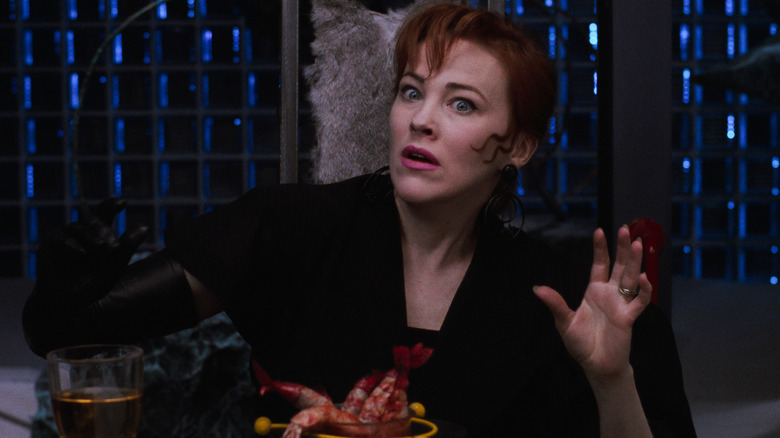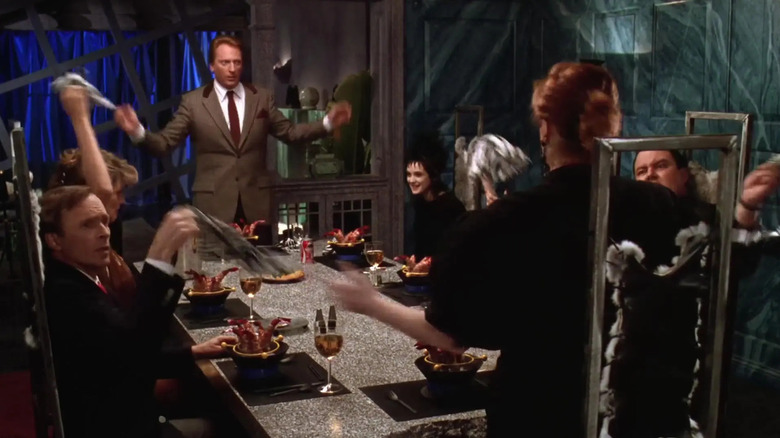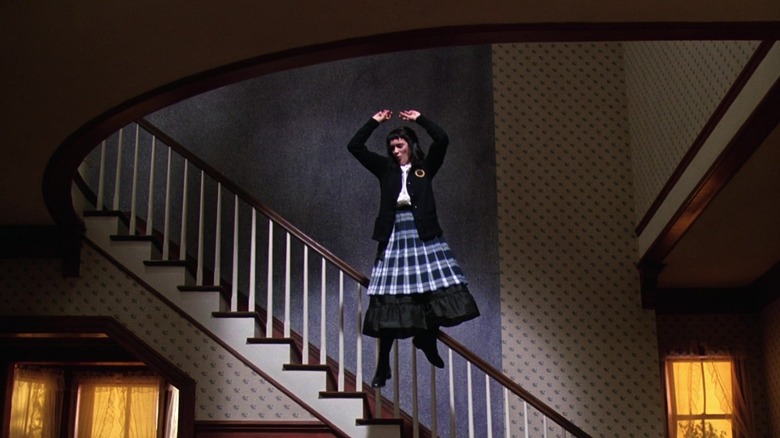What Harry Belafonte Loved The Most About His Songs Being Featured In Beetlejuice
The right song can take a movie scene from memorable to simply unforgettable, and few movie-music combinations have had the impact and staying power of Harry Belafonte's "Day-O (The Banana Boat Song)" in Tim Burton's "Beetlejuice." Belafonte's songs are all throughout the 1988 dark comedy about a ghost couple being haunted by an annoying living family that moved into their home, but "Day-O" is the big one, with the cast lip-syncing and dancing to the song during a bizarre dinner party. The moment is incredible, as new homeowners Charles (Jeffrey Jones) and Delia Deetz (Catherine O'Hara) invite over some of their fancy friends from the city, hoping to impress them with their large, oddly decorated house in the country. Instead, the home's original owners, Barbara (Geena Davis) and Adam Maitland (Alec Baldwin) decide to possess the dinner party in an attempt to scare them away and force the Deetzes to move out.
The scene is amazing with O'Hara and Jones mimic singing and dancing to the song, while Belafonte's booming baritone magically comes out of their mouths. It's some seriously funny stuff, but it's also a great tribute to Belafonte's music as the calypso tunes serve as a soundtrack for the ghostly rebellion. For the late Belafonte, however, there was a different reason to be excited about his music's inclusion, and it had to do with his voice.
'Daylight come and me wanna go home'
In an interview with Pitchfork, Belafonte shared the story of the "Beetlejuice" team and producer David Geffen reaching out to him to discuss using "Day-O" and a few other songs from the singer's catalog for "Beetlejuice":
"I never had a request like that before. We talked briefly. I liked the idea of Beetlejuice. I liked him. And I agreed to do it. What was particularly attractive was that he wanted to use my voice."
"Day-O" is originally a Jamaican folk song, and quite a few people have released their own versions of the song over the years. In 1955, Belafonte recorded his version, which became the version that most people know and love today, but several other artists recorded their versions in the 1950s as well, flooding the market with different interpretations of the same song. For "Beetlejuice," however, Belafonte's voice was perfect, as seeing it come out of Catherine O'Hara's mouth is so much funnier because of the depth of his tone. It gets even better at the end of the film when the Deetzes' daughter Lydia (Winona Ryder) is treated to a ghostly dance celebration and appears to sing Belafonte's "Jump in the Line (Shake Señora)." She floats in the air and "sings" and dances with a team of ghostly football players providing backup vocals, and it's pure cinematic joy. It's hard to imagine "Beetlejuice" without Belafonte's music, honestly, because it's so entwined with its legacy.
Jump in the line!
"Beetlejuice" is a tonal tightrope walk that just couldn't work without Belafonte's music. Originally, the dinner party was supposed to involve a song by The Ink Spots, best known for their crooning R&B (a lot less fun than the bouncy rhythms of calypso music). The stark juxtaposition of a diaspora song pouring out of the mouths of spoiled rich white people is truly ridiculous, and it gives the whole film a rebellious, joyful exuberance. Combined with Danny Elfman's creepy-cool score and standout performances from O'Hara, Ryder, Davis, Baldwin, and of course, Michael Keaton as the titular ghost with the most, "Beetlejuice" became a dark comedy classic that stands the test of time. It introduced a whole generation to Belafonte and music decades prior, haunting the soundtrack with steel drums and a definitive Jamaican patois.
Thank goodness for Belafonte, Geffen, and "Day-O," because "Beetlejuice" stinking rules. It might have seemed crazy at the time to mix 1950s and '60s calypso music with a 1980s gothic comedy, but sometimes the weirdest pairings are the best, just like the Maitlins and Lydia. For those looking to get their dance on, "Beetlejuice" is currently streaming on HBO Max.


